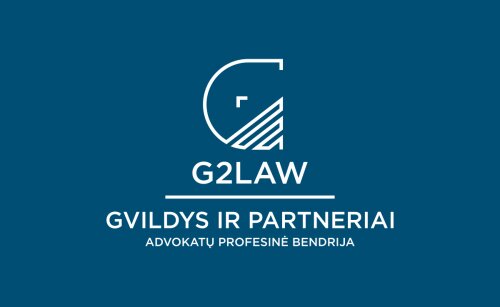Best Energy, Environment & ESG Lawyers in Klaipėda
Share your needs with us, get contacted by law firms.
Free. Takes 2 min.
List of the best lawyers in Klaipėda, Republic of Lithuania
About Energy, Environment & ESG Law in Klaipėda, Republic of Lithuania
Klaipėda, as Lithuania's principal seaport and a vital economic hub, plays a significant role in the country's energy and environmental landscape. The city is central to Lithuania's efforts to diversify its energy resources, promote sustainability, and adhere to Environmental, Social, and Governance (ESG) standards. Energy, Environment & ESG law in Klaipėda covers regulations relating to renewable energy development, industrial emissions, land and water use, compliance with European Union (EU) environmental standards, and corporate social responsibility. Both local and national authorities enforce rules intended to protect the environment, foster responsible energy use, and encourage businesses to operate sustainably and ethically.
Why You May Need a Lawyer
Legal professionals specializing in Energy, Environment & ESG can guide individuals, businesses, and organizations through complex regulations that may affect operations or property use in Klaipėda. Common situations where legal assistance is necessary include:
- Starting renewable energy projects such as wind or solar installations
- Obtaining environmental permits for construction, industrial, or maritime activities
- Addressing environmental contamination or pollution issues
- Complying with ESG disclosure requirements and sustainability evaluations
- Responding to regulatory actions, inspections, or fines for non-compliance
- Handling public consultations or environmental impact assessments
- Resolving disputes related to resource usage or environmental impact
- Managing energy supply contracts and regulatory approvals
Legal advice ensures that your activities meet all required standards and helps you navigate administrative procedures or defend your rights if disputes occur.
Local Laws Overview
Klaipėda, while governed by nationwide Lithuanian law, has several legal provisions and by-laws relevant specifically to its energy and environmental sectors due to its coastal and industrial character. Key aspects include:
- Environmental Protection Act: Outlines standards for air, water, and soil quality, waste management, and pollution prevention, incorporating EU directives.
- Renewable Energy Laws: Regulate the development and integration of wind, solar, biomass, and other renewable energy sources into the local power grid.
- Maritime and Coastal Regulations: Address pollution control, land use, and sustainable development along the coast and in port areas.
- Energy Sector Law: Details the rules for energy production, supply, security, and liberalization, supporting both traditional and alternative energy projects.
- ESG Reporting Requirements: Companies, especially larger ones, must adhere to laws mandating the disclosure of environmental and social impact information.
- Environmental Impact Assessment (EIA): Major projects require EIA to evaluate and mitigate negative impacts before approval.
- Local Building Codes and Zoning: Enforce sustainable construction and land use in Klaipėda, with additional restrictions in protected or sensitive areas.
Violations of these laws can result in penalties, operational delays, or demands for remedial action, highlighting the importance of compliance.
Frequently Asked Questions
What is ESG, and why is it important for businesses in Klaipėda?
ESG stands for Environmental, Social, and Governance. It refers to standards for a company’s behavior used by socially conscious investors and regulators. In Klaipėda, ESG compliance is important due to strict regulatory demands and stakeholder expectations, particularly for companies involved in energy, shipping, and manufacturing.
Do I need a permit to build a wind turbine or solar panel system?
Yes, you typically need permits from local and national authorities to install renewable energy systems. These include environmental, building, and grid connection permits. Consulting a lawyer ensures all requirements are met.
What are the main environmental risks for businesses in Klaipėda?
The main risks include air and water pollution, hazardous waste management, coastal erosion, and liability for contamination or non-compliance with environmental regulations. Businesses near the port or operating industrial facilities face stricter controls.
Is environmental impact assessment required for all projects?
Not all projects require an environmental impact assessment, but larger developments, especially those potentially affecting sensitive habitats or the coastal zone, do. Local authorities or the Environmental Protection Agency decide if an EIA is necessary.
How does Klaipėda enforce environmental laws?
Local municipal bodies and the national Environmental Protection Agency conduct inspections, review permits, and impose penalties or remediation measures for violations. Enforcement is especially rigorous in port and industrial zones.
What steps must companies take to comply with ESG regulations?
Companies must identify relevant ESG metrics, monitor their performance, integrate ESG factors into their operations, and prepare periodic reports for regulators and stakeholders. Legal advice helps clarify which standards apply to your business.
Can individuals take legal action against companies for environmental damage?
Yes, individuals, NGOs, or interest groups can bring complaints to authorities or initiate legal action if they suffer harm or witness violations. Lithuanian law allows for civil claims or administrative proceedings.
Are there incentives for using renewable energy in Klaipėda?
Lithuania offers various incentives such as subsidies, permits facilitation, and, at times, tax benefits for renewable energy projects. The specifics can depend on national and EU programs active at the time.
What are the penalties for environmental violations?
Penalties range from fines and operational suspensions to remedial obligations or revocation of permits. Repeated or severe violations can result in significant financial and reputational consequences.
Who regulates energy supply and infrastructure in Klaipėda?
Energy supply and infrastructure are regulated by the National Energy Regulatory Council (VERT), in coordination with local authorities and grid operators.
Additional Resources
If you are seeking further legal information or support regarding Energy, Environment & ESG in Klaipėda, consider contacting:
- Lithuanian Environmental Protection Agency (EPA): Manages permits and standards for pollution, resources, and protected areas.
- National Energy Regulatory Council (VERT): Supervises the energy sector, including tariffs, market access, and infrastructure regulation.
- Klaipėda City Municipality: Handles local environmental initiatives, permits, and zoning decisions.
- Klaipėda Free Economic Zone (FEZ) Administration: Provides guidance for businesses operating in the free economic zone, including compliance with ESG standards.
- Environmental NGOs: Such as the Lithuanian Green Movement or local organizations advocating for environmental protection and sustainability initiatives.
Next Steps
If you believe you need legal assistance in matters related to Energy, Environment & ESG in Klaipėda, start by assessing the specific issue or project you are facing. Collect any relevant documents, such as permits, correspondence with authorities, and business plans. Next, consult with a lawyer experienced in Lithuanian environmental and energy law, especially one familiar with Klaipėda's particular regulatory context. Legal experts can provide personalized guidance, help you prepare necessary documentation, represent you before authorities, and work to resolve any disputes or compliance challenges. Early legal advice can save time, minimize risks, and ensure that your activities align with both local laws and broader ESG standards.
Lawzana helps you find the best lawyers and law firms in Klaipėda through a curated and pre-screened list of qualified legal professionals. Our platform offers rankings and detailed profiles of attorneys and law firms, allowing you to compare based on practice areas, including Energy, Environment & ESG, experience, and client feedback.
Each profile includes a description of the firm's areas of practice, client reviews, team members and partners, year of establishment, spoken languages, office locations, contact information, social media presence, and any published articles or resources. Most firms on our platform speak English and are experienced in both local and international legal matters.
Get a quote from top-rated law firms in Klaipėda, Republic of Lithuania — quickly, securely, and without unnecessary hassle.
Disclaimer:
The information provided on this page is for general informational purposes only and does not constitute legal advice. While we strive to ensure the accuracy and relevance of the content, legal information may change over time, and interpretations of the law can vary. You should always consult with a qualified legal professional for advice specific to your situation.
We disclaim all liability for actions taken or not taken based on the content of this page. If you believe any information is incorrect or outdated, please contact us, and we will review and update it where appropriate.
Browse energy, environment & esg law firms by service in Klaipėda, Republic of Lithuania
Klaipėda, Republic of Lithuania Attorneys in related practice areas.













